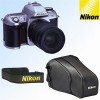Nikon F80QD User Manual - Page 24
Situa, tions, Where, Autofocus May Not, As Expected
 |
UPC - 718122227020
View all Nikon F80QD manuals
Add to My Manuals
Save this manual to your list of manuals |
Page 24 highlights
Situations Where Autofocus May Not Work As Expected • Autofocus may not work as expected in the following situations. In such situations, focus manually using the clear matte field (page 47) or focus on a different subject located at the same distance, use focus lock (page 44) then recompose. Low-contrast scenes For example, where the subject is wearing clothing the same colour as a wall or other background. Scenes with subjects within the focus brackets located at different distances from the camera For example, when shooting an animal in a cage or a person in a forest. Patterned subject or scene For example, building windows. Scenes with pronounced differences in brightness within the focus brackets For example, when the sun is in the background and the main subject is in shadow. 46 Manual Focus • Focus can be set manually when the focus mode selector is set to M. • Set the focus mode selector to M. Look through the viewfinder and rotate the lens focusing ring until a sharp image appears on the clear matte field in the viewfinder. The shutter can be released whether or not the subject is in focus. Use Manual focus in situations where autofocus may not work as expected (page 46) or a lens other than an AF Nikkor lens (page 35) is attached. • Manual focus using Electronic Rangefinder • Set the focus mode selector to M. The focus can be confirmed with / indication in the viewfinder. The Electronic Rangefinder works with most Nikkor lenses (including AF Nikkors when operated manually) having a maximum aperture of f/5.6 or faster. • Lightly press the shutter release button and while the meter is on, rotate the lens focusing ring until / appears in the viewfinder. The shutter can be released anytime. The Electronic Rangefinder can be activated with any of five focus brackets selected as the focus area (page 42). • When using a lens with the A-M select function, set the switch/ring to M to focus manually. If M/A (autofocus with manual priority) is available with your lens, Manual focus is possible either with the switch/ring set to M or M/A. See the instruction manual of your lens for details. 47 Focus















